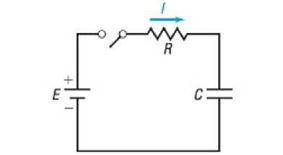
Concept explainers
120. Current in an RC Circuit The equation governing the amount of current I (in amperes) after lime t (in microseconds) in a single RC circuit consisting of a resistance R (in ohms), a capacitance C (in microfarads), and an electromotive force E (in volts) is

(a) If volts, ohms, and microfarad, how much current I1 is flowing initially ( )? After 1000 microseconds? After 3000 microseconds?
(b) What is the maximum current?
(c) Graph this function (t), measuring I along the and t along the .
(d) If volts, ohms, and microfarads, how much current I2 is flowing initially? After 1000 microseconds? After 3000 microseconds?
(e) What is the maximum current?
(f) Graph the function on the same coordinate axes as .
Want to see the full answer?
Check out a sample textbook solution
Chapter 5 Solutions
Precalculus
Additional Math Textbook Solutions
Elementary Statistics: Picturing the World (7th Edition)
Thinking Mathematically (6th Edition)
Elementary Statistics (13th Edition)
College Algebra (7th Edition)
Introductory Statistics
Basic Business Statistics, Student Value Edition
- Determine the exact signed area between the curve g(x): x-axis on the interval [0,1]. = tan2/5 secx dx andarrow_forwardSet up the partial fraction expansion of the function below. Do not explicitly solve for the variables 5 x²(x − 2)(x − 3)³ (24 - 81)² -arrow_forwardEvaluate the integral below: (4w (4w8) sec(4w) tan(4w) dwarrow_forward
- solve these pleasearrow_forwardA factorization A = PDP 1 is not unique. For A= 7 2 -4 1 1 1 5 0 2 1 one factorization is P = D= and P-1 30 = Use this information with D₁ = to find a matrix P₁ such that - -1 -2 0 3 1 - - 1 05 A-P,D,P P1 (Type an integer or simplified fraction for each matrix element.)arrow_forwardMatrix A is factored in the form PDP 1. Use the Diagonalization Theorem to find the eigenvalues of A and a basis for each eigenspace. 30 -1 - 1 0 -1 400 0 0 1 A= 3 4 3 0 1 3 040 3 1 3 0 0 4 1 0 0 003 -1 0 -1 Select the correct choice below and fill in the answer boxes to complete your choice. (Use a comma to separate vectors as needed.) A basis for the corresponding eigenspace is { A. There is one distinct eigenvalue, λ = B. In ascending order, the two distinct eigenvalues are λ₁ ... = and 2 = Bases for the corresponding eigenspaces are { and ( ), respectively. C. In ascending order, the three distinct eigenvalues are λ₁ = = 12/2 = and 3 = Bases for the corresponding eigenspaces are {}, }, and { respectively.arrow_forward
- N Page 0.6. 0.4. 0.2- -0.2- -0.4- -6.6 -5 W 10arrow_forwardDiagonalize the following matrix, if possible. 8 0 6 - 8 Select the correct choice below and, if necessary, fill in the answer box to complete your choice. 8 0 OA. For P= D= 0 3 6 0 B. For P = D= 0 -6 8 0 C. For P = D= 0 - 8 D. The matrix cannot be diagonalized.arrow_forwardCalculus lll May I please have the solutions for the following exercises? Thank youarrow_forward
 Algebra & Trigonometry with Analytic GeometryAlgebraISBN:9781133382119Author:SwokowskiPublisher:Cengage
Algebra & Trigonometry with Analytic GeometryAlgebraISBN:9781133382119Author:SwokowskiPublisher:Cengage Functions and Change: A Modeling Approach to Coll...AlgebraISBN:9781337111348Author:Bruce Crauder, Benny Evans, Alan NoellPublisher:Cengage Learning
Functions and Change: A Modeling Approach to Coll...AlgebraISBN:9781337111348Author:Bruce Crauder, Benny Evans, Alan NoellPublisher:Cengage Learning Algebra and Trigonometry (MindTap Course List)AlgebraISBN:9781305071742Author:James Stewart, Lothar Redlin, Saleem WatsonPublisher:Cengage Learning
Algebra and Trigonometry (MindTap Course List)AlgebraISBN:9781305071742Author:James Stewart, Lothar Redlin, Saleem WatsonPublisher:Cengage Learning College Algebra (MindTap Course List)AlgebraISBN:9781305652231Author:R. David Gustafson, Jeff HughesPublisher:Cengage Learning
College Algebra (MindTap Course List)AlgebraISBN:9781305652231Author:R. David Gustafson, Jeff HughesPublisher:Cengage Learning Algebra: Structure And Method, Book 1AlgebraISBN:9780395977224Author:Richard G. Brown, Mary P. Dolciani, Robert H. Sorgenfrey, William L. ColePublisher:McDougal Littell
Algebra: Structure And Method, Book 1AlgebraISBN:9780395977224Author:Richard G. Brown, Mary P. Dolciani, Robert H. Sorgenfrey, William L. ColePublisher:McDougal Littell





